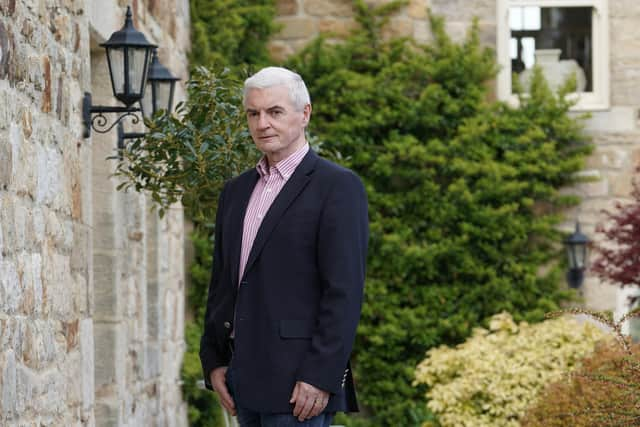'Countless thousands of jobs and future jobs are at severe risk': Scots firms outline their hopes and fears regarding the 2021 Autumn Budget
and live on Freeview channel 276
And indeed businesses in Scotland will be paying very close attention to relevant announcements and their expected impact.
Andrew Howie, managing partner for Grant Thornton UK LLP in Scotland, recently said the business community wants to see “support that offers a clear path to recovery and growth” – with help to address skills shortages among top priorities.
Advertisement
Hide AdAdvertisement
Hide AdAnd Alex Tait, the UK’s regional managing partner for Scotland and Northern Ireland at audit, tax and consulting RSM, calls for real action to “level up” and better support middle-market businesses, translating into “real commitment to invest to ensure they can plan effectively”.


He also says Mr Sunak “appears to be in an unenviable position”, needing to both show how he will simultaneously achieve four fiscal objectives, and keep “some capacity to announce mooted pre-election tax cuts in 2023 or 2024”.
And Robert Kilgour, executive chairman of Musselburgh-based care homes business Renaissance Care, and founder and chairman of pro-Union organisation Scottish Business UK, agrees.
He cheers the “huge success” of the UK job furlough scheme that has protected “thousands of Scottish jobs, Scottish businesses, and the Scottish economy”.
Advertisement
Hide AdAdvertisement
Hide AdMr Kilgour adds: “However, the Chancellor’s key priority and main focus just now should be the enabling of our economic recovery post-pandemic by the creating of the right climate to encourage those of us in business to take risks, invest and create much-needed jobs and the wealth that pays the taxes that provide for our much-needed and ‘hungry’ public services.”


The small and medium-sized enterprise (SME) sector, he adds, “can be the engine of growth that drives our post-pandemic economic recovery – but it must be encouraged and supported by the Chancellor and not discouraged and hindered by having new cost hurdles put in our way and extra and higher taxes introduced”.
Mr Kilgour also praised confirmation of a £150 million fund for SMEs north of the Border, saying it “will really help a lot of Scottish businesses invest and grow and create thousands of new Scottish jobs”.
The fund is expected to be confirmed in the Budget, along with the national living wage being increased to £9.50 – with the latter welcomed with open arms by Belinda Jarron, managing partner at Fleurtations, a plantscaping business based in East Lothian.
Advertisement
Hide AdAdvertisement
Hide AdShe adds: “If we pay people properly, regardless of their age, more will be able to get into work and help address the employment shortages seen across many industries.”
Also looking at potential wage threshold rises is Alistair Dickson, head of Scotland at SKSI, a professional services company providing economic insights and advice to businesses.
He points out that higher minimum and living wages will inevitably affect running costs, with a knock-on effect on investment, pay rises and job-creation.
“The likelihood for a lot of businesses – particularly in industries such as retail and hospitality – is that costs will have to be passed on to consumers,” he said.
Advertisement
Hide AdAdvertisement
Hide AdMr Dickson also touched on the Global Britain Investment Fund expected to be announced in the Budget, saying: “The Chancellor’s promise to spend £1.4 billion to spur a wave of investment in UK innovation could be terrific for businesses in those sectors.”
That comes as Moray Martin, chief executive of Tricapital Angel Investors, an experienced business angel syndicate based in Scotland, says he sees many “innovative and promising” early and mid-stage businesses “currently hanging on by their financial fingernails”.
He continues: "Countless thousands of jobs and future jobs are at severe risk across all sectors, with potentially devastating consequences for the economy in general. Coupled with the growing impact of inflation, wage inflation, higher interest rates and supply-chain contraction, never has the need to mobilise angel capital been more acute.”
Incentives
He would therefore like to see the Chancellor use the Budget “to provide greater incentives to investors via the Enterprise Investment Scheme, at least in the short term, to encourage and accelerate the bottom-up investment I believe is necessary to drive growth and sustainability".
Advertisement
Hide AdAdvertisement
Hide AdAnother area that has been hanging by a thread is hospitality, whose fortunes are inevitably tied up with what the Budget will be serving. The Scottish Licensed Trade Association, for example, is calling on Westminster to “overhaul” the alcohol excise duty system, cutting duty in pubs and bars and raising it in off-sales.
Dominic Tait, founder of Borders-based drinks-maker Valentian Vermouth, says the drinks and hospitality industries are a fundamental part of the nation’s economy, and a strong post-pandemic bounceback “is imperative, so we hope the Chancellor will take a positive approach to duty”.
He adds: “We already have the highest rates of duty in Europe … we wouldn't expect a cut in duty, that would be probably unrealistic or too optimistic, but a freeze is essential.
“We [also] recognise that as we move towards 2030 and the phasing-out of fossil fuel and the taxes related, there are sectors that will be taxed heavily to replace fuel duty. However, there must be a pragmatic approach to this and a realisation that drinks and hospitality provide huge benefit to the economy.”
Advertisement
Hide AdAdvertisement
Hide AdTaking a broad look at the measures Mr Sunak will announce, Ms Jarron says: “From what we have seen so far, I feel a mixture of cautious encouragement and relief at the direction the Budget is likely to take.
"At Fleurtations, we are recovering well from the pandemic, with business slowly returning to pre-pandemic levels. The most important thing to come from the Budget is to ensure the business environment remains in a position where that recovery can continue for us, and everybody else.”
But she adds: “Ultimately, the country is emerging from one of the most challenging periods in recent memory, and it will take more than one Budget to set things back on track.”
A message from the Editor:
Thank you for reading this article. We're more reliant on your support than ever as the shift in consumer habits brought about by coronavirus impacts our advertisers.
If you haven't already, please consider supporting our trusted, fact-checked journalism by taking out a digital subscription.
Comment Guidelines
National World encourages reader discussion on our stories. User feedback, insights and back-and-forth exchanges add a rich layer of context to reporting. Please review our Community Guidelines before commenting.
